
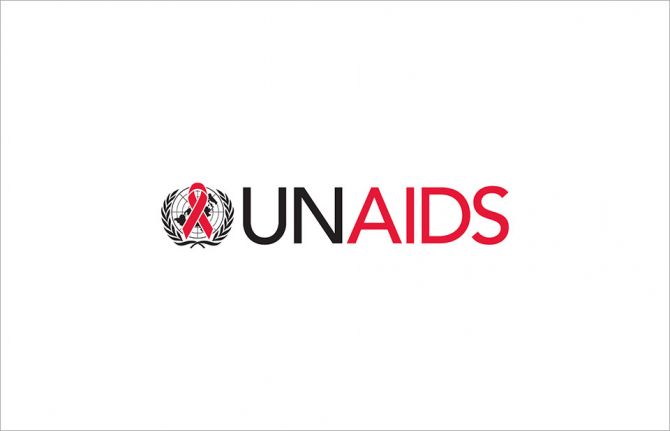
Press Statement
UNAIDS urges Kazakhstan to protect public health
19 December 2025 19 December 2025GENEVA, 19 December 2025— UNAIDS notes with concern the adoption of the bill banning so-called LGBTQ “propaganda” in Kazakhstan. While the stated objective of the legislation is the protection of children and traditional values, it may inadvertently restrict access to critical public health information and services, affecting the country’s efforts to end AIDS by 2030.
Kazakhstan has made remarkable progress in strengthening its HIV response. The country is advancing rapidly toward the 95–95–95 targets (95% of people living with HIV know their HIV status; 95% of people who know their HIV status are on treatment and 95% of people on treatment have a suppressed viral load), expanding access to modern treatment for 90% of people living with HIV who knowing their status, and scaling up Pre-exposure Prophylaxis (PrEP) from 200 to more than 132,000 clients in just two years. Community-led services are now integrated nationwide through social contracting, and the country domestically funds 94% of HIV response— an exceptional demonstration of national ownership and commitment.
Evidence from across the region and globally shows that punitive and restrictive laws increase stigma, discourage people from seeking HIV services, and limit the ability of service providers to deliver essential HIV prevention and reproductive health information. Such measures can push LGBTQ communities underground, creating significant barriers to access prevention, testing and treatment, and increasing the risk of new HIV infections among a population already disproportionately affected by the epidemic.
To safeguard these achievements and protect public health, UNAIDS calls Kazakhstan to reconsider the legislative amendments, ensuring that all people in the country continue access the services they need without fear, stigma, or discrimination.
UNAIDS
The Joint United Nations Programme on HIV/AIDS (UNAIDS) leads and inspires the world to achieve its shared vision of zero new HIV infections, zero discrimination and zero AIDS-related deaths. UNAIDS unites the efforts of 11 UN organizations—UNHCR, UNICEF, WFP, UNDP, UNFPA, UNODC, UN Women, ILO, UNESCO, WHO and the World Bank—and works closely with global and national partners towards ending the AIDS epidemic by 2030 as part of the Sustainable Development Goals. Learn more at unaids.org and connect with us on Facebook, Twitter, Instagram and YouTube.
Region/country

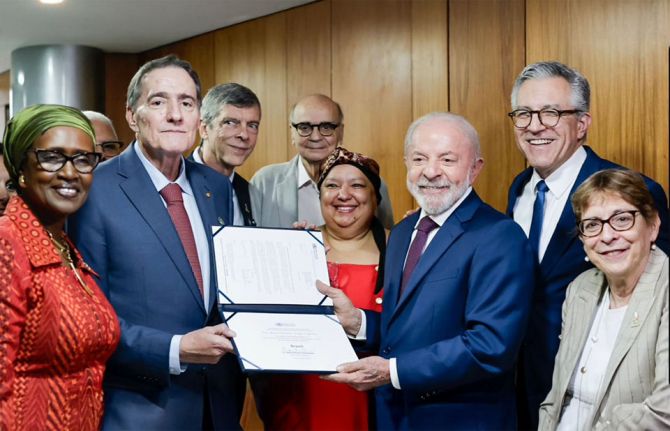
Press Statement
UNAIDS congratulates Brazil for eliminating vertical transmission of HIV
18 December 2025 18 December 2025GENEVA, 18 December 2025–UNAIDS congratulates Brazil in attaining the certification for the elimination of mother-to-child transmission (EMTCT) of HIV as determined by the World Health Organization.
“I am delighted that Brazil has just been certified by WHO-PAHO for eliminating vertical transmission – the first country of more than 100 million people to do so,” said Winnie Byanyima, UNAIDS Executive Director.
“They did it by doing what we know works: prioritising universal healthcare, tackling the social determinants that drive the epidemic, protecting human rights, and even when necessary breaking monopolies to secure access to medicines.”
WHO develops and regularly updates guidance on the criteria and processes for validation of EMTCT of HIV, syphilis and/or Hepatitis B virus. Since 2015, Member States have been able to apply for validation for achieving the reduction of mother-to-child transmission to a level where it is no longer a public health threat or problem.
In the Americas, WHO recognized the dual elimination for Cuba in 2015, Anguilla, Antigua and Barbuda, Bermuda, Cayman Islands, Montserrat, and St. Kitts and Nevis in 2017, and Belize, Jamaica and Saint Vincent in 2024. More recently, the Maldives achieved ‘triple elimination’ of hepatitis B, HIV and syphilis – the first country ever to do so.
A study by Fundação Oswaldo Cruz (Fiocruz), Brazil’s leading public health research institute, found that the Bolsa Família cash transfer program was linked to significant reductions in AIDS cases and deaths among vulnerable women and children. Analyzing data from over 12 million low-income women, Fiocruz reported that the program was associated with nearly halving AIDS incidence and mortality rates, with the greatest impact seen among women facing multiple vulnerabilities, particularly Afro descendant mothers living in extreme poverty.
“Brazil is the largest country in the world to eliminate vertical transmission of HIV. The advances we celebrate reflect a collective, national, and global effort that has consolidated free access to antiretroviral therapy and modern prevention strategies in the country,” said Braziian Minister of Health, Alexandra Padilha. “Today the public health system guarantees comprehensive care for people living with HIV and strives to expand access to even more efficient treatments.”
UNAIDS
The Joint United Nations Programme on HIV/AIDS (UNAIDS) leads and inspires the world to achieve its shared vision of zero new HIV infections, zero discrimination and zero AIDS-related deaths. UNAIDS unites the efforts of 11 UN organizations—UNHCR, UNICEF, WFP, UNDP, UNFPA, UNODC, UN Women, ILO, UNESCO, WHO and the World Bank—and works closely with global and national partners towards ending the AIDS epidemic by 2030 as part of the Sustainable Development Goals. Learn more at unaids.org and connect with us on Facebook, Twitter, Instagram and YouTube.
Contact
UNAIDS GenevaCharlotte Sector
sectorc@unaids.org
UNAIDS Brazil
Thainá Kedzierski
kedzierskith@unaids.org
Region/country

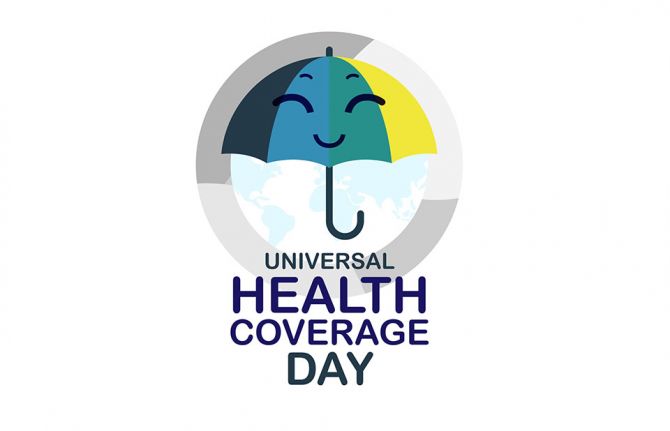
Press Statement
Inclusive, rights-based HIV services a key component to Universal Health Care
12 December 2025 12 December 2025GENEVA, 12 December 2025–For the past four decades, the HIV response has worked hard advocating for HIV treatment but also other HIV and health services that are free, without stigma or discrimination, people-centred, and grounded in human rights. It is by delivering inclusive, rights-based HIV and health services, that Universal Health Coverage (UHC) can be achieved.
On Universal Health Coverage Day, UNAIDS stresses the importance of UHC so that everyone has access to the quality health services they need without suffering financial hardship due to the cost of paying for those services. UHC should include quality essential HIV services from prevention to treatment through a clearly defined health benefit package.
“The HIV response is a stress test for UHC so when people living with HIV, key and other vulnerable populations are excluded, the entire health system fails,” said Angeli Achrekar, UNAIDS Deputy Executive Director, Programmes. “When they are included however, the system becomes stronger, fairer and more efficient for all.”
Currently 9.2 million people still do not have access to HIV treatment, and millions more cannot obtain PrEP– medicine which prevents HIV. UHC, health security, and ending HIV, Tuberculosis and malaria are not separate ambitions. They are intersecting global goals that can only be attained as one. In addition, as the HIV movement learned long ago: health is never just the health sector’s job.
Communities have shown the clearest path to UHC with community-led testing, peer navigation, differentiated service delivery, rights advocacy, and accountability. People need integrated services throughout their lives, delivered where and by whom they prefer, including by their own communities.
“UHC cannot be universal unless it works for people living with HIV and other affected communities,” said Florence Riako Anam, Co-Executive Director GNP+ (Global Network of People Living with HIV). “UHC will only succeed when our voices, our leadership, and our lived experience shape the services and care we rely on to stay alive.”
On UHC Day, UNAIDS calls on governments and partners to:
- Sustainably fund HIV and community-led services
- Remove discriminatory and punitive laws
- Integrate HIV services with primary health care without compromising rights or quality
- Put people living with HIV and communities at the centre of decision-making, service delivery design and implementation
Ending AIDS and achieving UHC together is a powerful and necessary legacy for today’s leaders. It is also a shared responsibility from governments, communities, development partners to the private sector as well as individuals. The forthcoming Global AIDS Strategy for 2026–2031 and the next generation of HIV integration targets are fully aligned with UHC affirming that progress on HIV and progress on universal health coverage is inseparable.
The way forward is integration.


Press Statement
Human Rights Day statement
10 December 2025 10 December 2025Geneva, 10 December 2025 – This Human Rights Day the global HIV response is facing its most challenging moment in decades.
A new UNAIDS report released last month ahead of World AIDS Day 2025, Overcoming Disruption, Transforming the AIDS Response details the far-reaching consequences of international funding reductions. Millions of people have lost access to HIV prevention services and the critical support to access life-saving treatment services. A deepening funding crisis, geopolitical fragmentation, and rollback of human rights protections have disrupted services and jeopardized decades of progress.
The advocacy of people living with, affected by and vulnerable to HIV, communities and civil society allies, who have built and sustained significant community health systems and have championed a human rights and gender transformative approach, has made an unparalleled contribution to the progress made to date in reaching people with HIV prevention, treatment and care services.
The current disruption of the HIV response also takes place in a growing anti-rights and anti-gender context, and when most high burden countries that were receiving external financial support for the HIV response have limited fiscal space, are highly indebted, and not immediately able to fund their domestic responses to HIV.
Punitive laws, stigma and discrimination continue to block access to HIV services for the most marginalized communities: women and girls, LGBTQ+ people, sex workers, people who use drugs, and incarcerated populations. When rights are denied, health is denied. When people fear arrest or violence for seeking care, the epidemic grows. Protecting and promoting human rights is therefore not optional, it is essential to ending AIDS.
However, amid these challenges, we see resilience. Communities are stepping up, governments are increasing domestic investments, and innovations in service delivery are emerging. But transformation will only succeed if it is anchored in human rights.
Human rights-based approaches are essential to a sustainable HIV response. Fostering resilient societies where human rights are protected and communities are enabled to lead requires long-term structural and systemic changes, including investments. This Human Rights Day, UNAIDS calls on global leaders to:
- Reaffirm global solidarity, multilateralism and the collective commitment to fight and end AIDS together; maintain funding for the response; and to invest in innovation, including affordable long-acting HIV prevention and treatment options.
- Uphold human rights. Empower communities.
- We call on all partners to defend the right to health as a fundamental human right. This means standing firm for bodily autonomy and sexual and reproductive health and rights, ensuring that every person has the freedom and dignity to make decisions about their own body and health.
- And we must strengthen community-led action, because communities are at the heart of every successful response. Their voices, leadership, and lived experience drive progress and accountability
Related resources

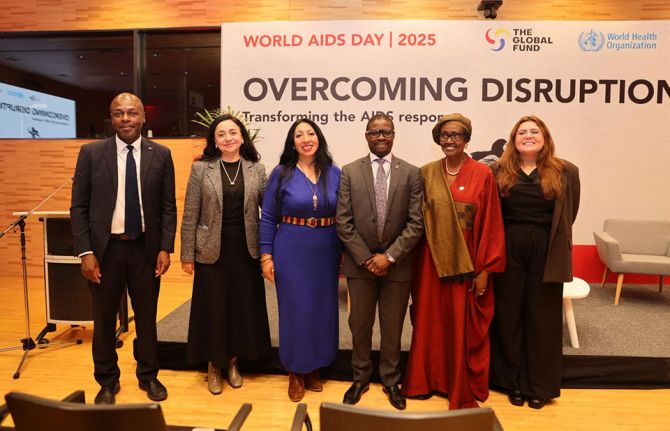
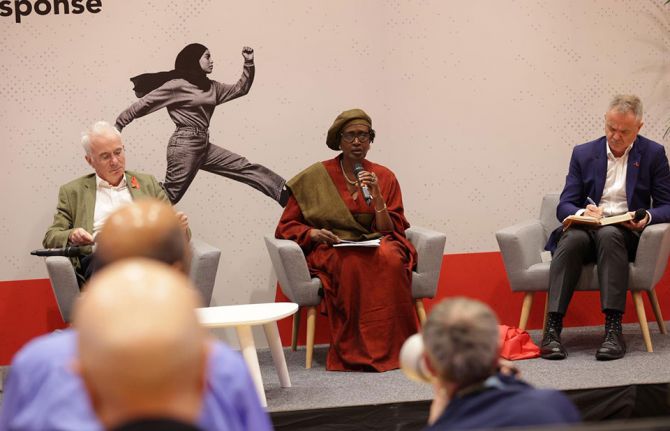


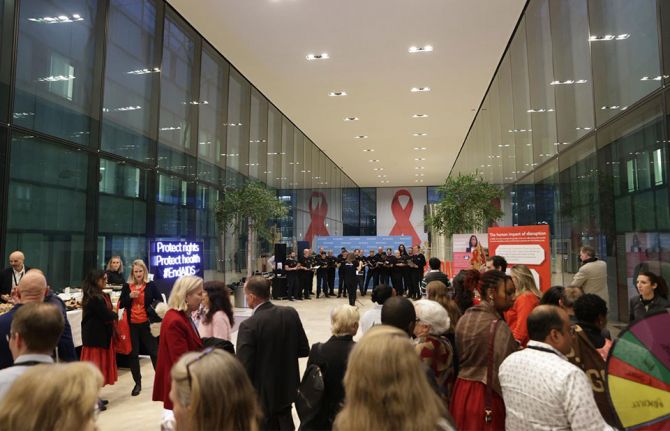
Press Statement
UNAIDS, WHO and the Global Fund call for political leadership, international cooperation, and community-led approaches at a joint World AIDS Day event
01 December 2025 01 December 2025GENEVA, 1 December 2025—UNAIDS, WHO and the Global Fund brought together members of communities, civil society organizations and government representatives to commemorate this year’s World AIDS Day at an event at UNAIDS headquarters in Geneva, Switzerland.
“Our progress is fragile and is now under threat due to the collapse of international assistance and the regression on human rights,” said Winnie Byanyima, UNAIDS Executive Director. In 2025, a historic funding crisis threatened to unravel decades of progress. HIV prevention services were severely disrupted. Community-led services, vital to reaching marginalized populations were also deprioritized while the rise in punitive laws criminalizing same-sex relationships, gender identity, and drug use amplified the crisis, making HIV services inaccessible to many.
Speakers during three separate panels noted that the global AIDS response had suffered severe setbacks and stressed that much more needs to be done to end AIDS as a public health threat by 2030. They focused on the fact that AIDS is not over and given today’s environment, a new transformative approach is needed to mitigate risks and not get derailed completely.
Ways forward mentioned involved finding alternative sources of funding, community leadership and a push for innovation as well as a call for unity.
“What keeps us going is resilience, innovation and community strength but resilience alone cannot sustain the health system,” said Pasquine Ogunsanya, Executive Director of Alive Medical Services, from Uganda.
A sentiment echoed by Peter Sands, The Global Fund Executive Director. “Innovation is the only way to sustain progress while doing it with less money,” he said.
Participants also called on countries and the international community to come together to bridge the loss of resources, support countries in closing the remaining gaps in HIV prevention and treatment services, remove legal and social barriers, and empower communities more.
“Without the support from international organizations, communities, civil society, governments and the private sector, no one actor will be able to deliver on the promise of lenacapavir,” said Tenu Avafia, UNITAID Deputy Executive Director.
Lenacapavir is a twice-yearly HIV-prevention injectable drug shown to reduce the risk of HIV transmission by 99%. The drug's first public rollouts have started in eastern Africa, which has one of the world's highest HIV burden.
The World AIDS Day joint event also paid tribute to the millions of lives lost to AIDS by lighting a candle and one minute of silence. Keren Dunaway, Programme Officer with ICW and LLAVES, an organization that defends the rights of people living with HIV said, “We recommit to ensuring that everyone living with HIV has access to the treatment they need, to services to prevent new infections, and that we can and will end AIDS together.”
QUOTES:
"As the governments, funders and global leaders continue to debate and decide how global resources should be allocated, let me remind you this: As young people we are not statistics. We are not graphs on a powerpoint presentation. So when you are cutting those budget lines, you are cuting our lives. When you are withdrawing the funding, you are withdrawing us, you are denying us an opportunity to thrive and an opprtunity to survive and achieve our hopes and dreams for the future." Paul Mavesere Ndhlovu, Peer Provider/HIV Advocate, Zvandiri, Zimbabwe.
"We will keep fighting, we will keep the commitment because we are doing it for the people who would otherwise be in the cementary but are here now to celebrate life." Gracia Violeta Ross, HIV Lead, World Council of Churches.
Watch the event
Continued here:

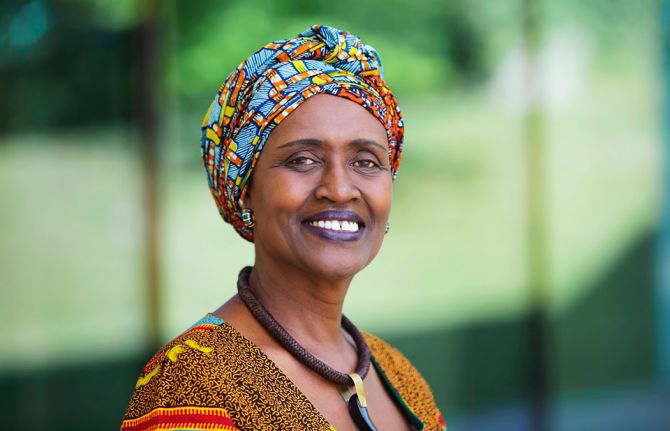
Press Statement
World AIDS Day 2025 — Message from Winnie Byanyima, Executive Director of UNAIDS
01 December 2025 01 December 2025This World AIDS Day, fragile progress is under threat.
Let me tell you about Noncedo Khumalo, a 24-year-old peer mentor in Eswatini. She supported women and girls in her community at risk of HIV, especially from older men who target them for transactional sex. But now, the programme funding her work has been terminated, and Noncedo has lost her job.
She is worried about the future. Many of the young women and girls she worked with are not well informed about HIV. Losing a peer mentor – a person like them, whom they can trust – puts them at risk of HIV infection.
Noncedo is not the only one.
Over 60% of all women-led HIV organizations have lost funding or been forced to suspend work. Other HIV prevention services have been hit hard too. The number of people using PrEP—HIV prevention medicines—has fallen by 64% in Burundi, 31% in Uganda and 21% in Viet Nam.
All this comes amid a regression in human rights. The number of countries criminalising same-sex relationships has increased this year with Burkina Faso, Niger, Mali and Trinidad and Tobago introducing criminalization. And this amidst a broader wave of new regressive legislation.
In the last 12 months alone, 316 million women were subjected to physical or sexual violence by an intimate partner. Laws protecting the bodily autonomy and sexual and reproductive rights of adolescent girls and women are under threat. Some countries have come close to repealing laws banning female genital mutilation.
In Sub-Saharan Africa, women who have experienced intimate partner violence in the past year are 3.2 times more likely to acquire HIV.
Make no mistake, there is a determined, organized, and well-funded campaign against human rights – particularly the rights of women and girls and LGBTIQ+ people. This campaign is pushing people further away from lifesaving HIV services
Yet in the hardest of circumstances, I am hopeful that we can overcome disruption and transform the AIDS response.
I take incredible inspiration from the communities, leaders, and civil society organisations who have rallied to support each other and the AIDS response.
Many governments have taken action to increase domestic funding for health and HIV funding. That has enabled some countries to maintain or even increase the number of people receiving HIV treatment.
The African Union Roadmap to 2030, adopted by Member States in 2025, focuses on sustaining the HIV response and strengthening health systems. The recently launched Accra Reset places health financing and sovereignty at the heart of a transformed development ecosystem.
UNAIDS is supporting countries to increase domestic financing for HIV. So far, 25 countries have developed their own HIV sustainability roadmaps towards a future HIV response, that is more self-reliant, better integrated into the broader health system, and that keeps communities at the centre.
However, with revenue collection in Africa at just 16% of GDP – far lower than the global average – there is only so much governments can do. Health taxes and other innovative measures can be helpful in the short term. But for serious domestic HIV financing, low and middle-income countries need continued economic growth, curbing of tax dodging, and progressive taxation of income, wealth, and corporate profits.
A major barrier is that the countries with the highest HIV burdens are also some of the world’s most indebted. Interest rates have spiked, with debt repayments now exceeding health budgets in many low and middle income countries.
This year’s Financing for Development Conference and G20 Summit highlighted the problem and urgent need for action. But in 2026, governments need to make debt restructuring a reality, allowing countries to increase their domestic HIV and health spending.
The good news is that some countries are advancing human rights. In Rwanda, for example, adolescents can now access sexual and reproductive services without parental consent from the age of 15 – empowering young people to protect their health and keep themselves safe.
The first doses of Lenacapavir, the new, twice-yearly PrEP injections have arrived in Africa. The rollout is not moving fast enough, too few manufacturers have been licensed to produce a generic version, and too many developing countries have been excluded from accessing a generic. This is fundamental issue of justice.
And in a tough financial landscape, donor governments are not walking away. The America First Global Health strategy is continuing significant investment in the HIV response. And the eighth replenishment of the Global Fund to Fight AIDS, Tuberculosis and Malaria has secured pledges of more than US$ 11.34 billion so far – with several more major pledges expected.
Developing countries are beginning the gradual transition towards more sustainable, inclusive, and nationally owned HIV responses. That is how we can overcome disruption and end AIDS as a public health threat.
There is no silver bullet. No one measure alone will get us there. But if governments, communities, and international organisations can come together to unlock domestic HIV financing, protect human rights and gender equality, and make new innovations affordable and accessible for all, we can seize this moment. The world can end AIDS.
UNAIDS
The Joint United Nations Programme on HIV/AIDS (UNAIDS) leads and inspires the world to achieve its shared vision of zero new HIV infections, zero discrimination and zero AIDS-related deaths. UNAIDS unites the efforts of 11 UN organizations—UNHCR, UNICEF, WFP, UNDP, UNFPA, UNODC, UN Women, ILO, UNESCO, WHO and the World Bank—and works closely with global and national partners towards ending the AIDS epidemic by 2030 as part of the Sustainable Development Goals. Learn more at unaids.org and connect with us on Facebook, Twitter, Instagram and YouTube.
Related resources

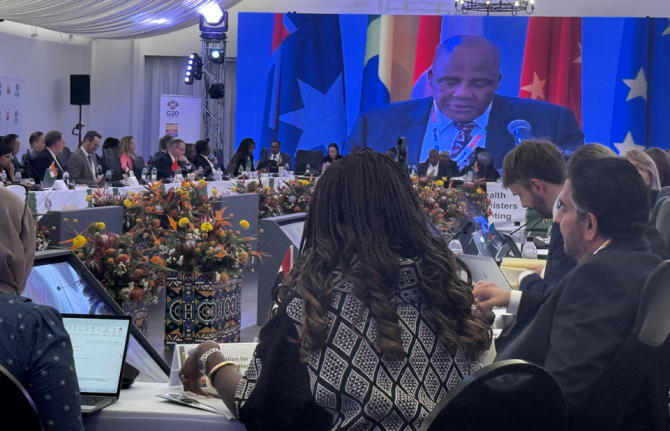
Press Statement
G20 Statement sets out actions to protect public health by fighting inequalities. Experts say the inequality-pandemic cycle can be broken.
07 November 2025 07 November 2025POLOKWANE, SOUTH AFRICA, 7 November 2025 — The Ministerial Statement issued from the G20 Ministerial in Polokwane has set out concrete actions to protect public health by fighting inequalities. The statement details key global and national steps to address the inequality-drivers of pandemics including AIDS and to help end TB, to advance access to medicines and to strengthen global health security.
South Africa’s leadership of the G20 has been praised by experts including Nobel Prize Winning Economist Joseph E. Stiglitz, world-leading epidemiologist Sir Michael Marmot, and Executive Chairperson of the One Economy Foundation and former First Lady of Namibia Monica Geingos, the three Co-Chairs of the Global Council on Inequality, AIDS, and Pandemics established by UNAIDS.
The statement reflects important alignment with the Global Council’s landmark new report, Breaking the inequality-pandemic cycle: building true health security in a global age, which revealed a vicious cycle: how inequality is making pandemics more likely, more deadly and more costly; and how pandemics are increasing inequalities. The Global Council held the international launch of the report on Monday this week in Johannesburg and then presented the report to President Cyril Ramaphosa in Cape Town on Tuesday, before heading to Polokwane to address health ministers on Thursday and Friday.
The statement sets out key actions to be taken that were recommended by the Global Council’s report including through:
- Promoting affordable, rapid access to pandemic medicines like long-acting HIV drugs
- Addressing the ways high levels of debt are making the world vulnerable
- Tackling the social determinants of health
UNAIDS Executive Director Winnie Byanyima, who convened the Global Council on Inequality, AIDS, and Pandemics, paid tribute to South Africa for its leadership in advancing access to medicines, on debt and financing, and for its drive for universal health coverage through national health insurance. “President Ramaphosa is lighting the way to a world that is both fairer and safer. Inequality is bad for public health. International action to address inequality will benefit everyone,” she remarked.
Sir Michael Marmot said: “South Africa is right to insist that the inequality-pandemic cycle can be broken, and is right to highlight that failing to act would be dangerous and unaffordable. The world needs to move urgently from the dangerous failure of austerity to the proven effectiveness of investments in health and in the social determinants of health.”
Joseph E. Stiglitz speaking at the Ministerial congratulated South Africa for modelling leadership in health through its national health insurance programme. He urged countries in the Global North to lift the barriers blocking access to pandemic-ending medical technology for millions of people in the Global South. “Viruses don’t know about passports and visas,” he noted. “We need everyone to be safe in order to protect all world population from future and worse pandemics. “
Monica Geingos stated: “We have leadership from South Africa as chair of the G20, and from other countries, and we have leadership from civil society across the world. We have the evidence of what needs to be done, set out in the Breaking the Inequality-Pandemic Cycle report. And we have shown that the actions needed to break this cycle are in the interests of every country, that breaking the inequality-pandemic cycle is not only the right thing to do but is the smart thing to do.”
/ENDS
Notes for editors
The G20 Ministerial Statement will be posted by G20 chair South Africa soon here: https://g20.org/track/health/
The Global Council on Inequality, AIDS, and Pandemics report Breaking the inequality-pandemic cycle: building true health security in a global age, is available here: https://www.inequalitycouncil.org/wp-content/uploads/2025/11/Report-2025_Global-Council-report_En.pdf
Related resources

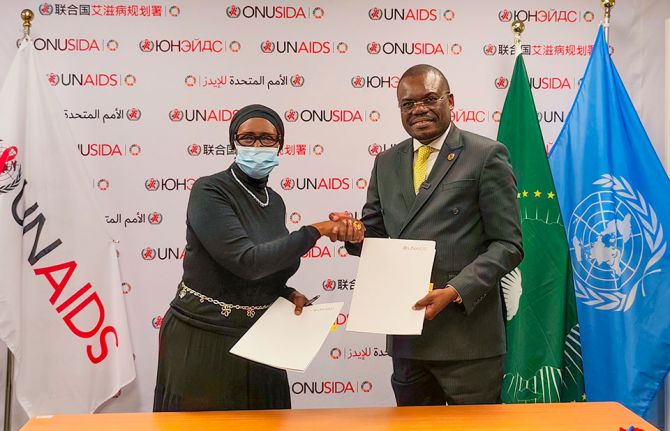
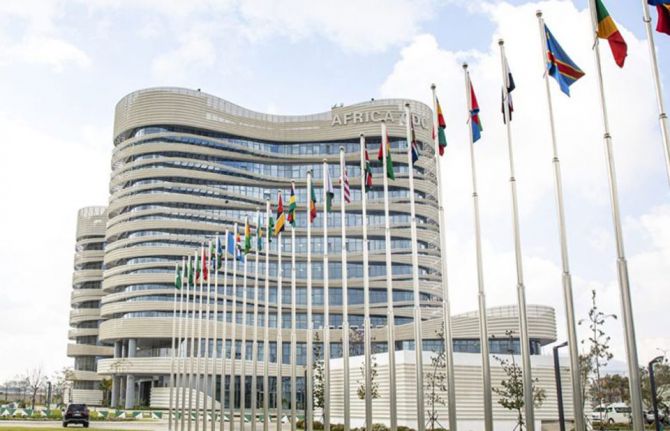
Press Statement
UNAIDS and Africa Centres for Disease Control and Prevention sign landmark agreement to strengthen community health systems and epidemic preparedness across Africa
26 September 2025 26 September 2025NEW YORK, 26 September 2025—UNAIDS and the Africa Centres for Disease Control and Prevention (Africa CDC) have today signed a Memorandum of Understanding (MoU) on the sidelines of the United Nations General Assembly to deepen collaboration in advancing Africa’s health security, strengthening community health systems, and ensuring sustainable HIV responses.
“UNAIDS has a major role to play. We are signing this MoU to send a strong message that Africa supports UNAIDS,” said Dr. Jean Kaseya, Director-General of Africa CDC. “HIV is still a major public health issue in Africa. Africa CDC is a proud partner of UNAIDS.”
“By joining forces, we can strengthen community health workforces, advance local manufacturing, and secure sustainable financing for HIV and broader health services,” said Winnie Byanyima, Executive Director of UNAIDS. “Together, we are laying the foundation for healthier, more equitable societies across Africa. This MoU is about UNAIDS supporting Africa CDC to build its own feet on the ground and build capacity in the institution to take over and support countries.”
The agreement establishes a framework for joint action in areas of mutual interest, including:
- Expanding community health workforces: Supporting the African Union’s 2017 Heads of State mandate on the 2 Million Community Health Worker Initiative through training, reskilling, and deployment of polyvalent community health workers in hard-to-reach rural and emergency settings, with targeted outreach to populations most at risk of being left behind.
- Bolstering epidemic and pandemic preparedness: Leveraging UNAIDS’ data and technical platforms with Africa CDC’s regulatory networks to ensure access to, quality and affordability of HIV commodities, while strengthening Africa’s local manufacturing capacity of essential medicines and driving advocacy for technology transfer.
- Ensuring sustainable HIV responses: Supporting African Union Member States to develop and implement sustainability and transition plans embedded in national health financing strategies. This includes expanding domestic revenue mobilization, integrating HIV services into primary health care and national insurance schemes, and exploring diversified funding instruments such as debt relief mechanisms and blended financing.
- Joint project development and resource mobilization: Designing collaborative programmes aligned with the mandates of both institutions, mobilizing resources from partners, and extending technical expertise through staff secondments where beneficial.
The signing of the MoU reflects a shared commitment by UNAIDS and Africa CDC to drive progress towards the achievement of the Sustainable Development Goals, and the vision of a healthier, more resilient continent.
UNAIDS
The Joint United Nations Programme on HIV/AIDS (UNAIDS) leads and inspires the world to achieve its shared vision of zero new HIV infections, zero discrimination and zero AIDS-related deaths. UNAIDS unites the efforts of 11 UN organizations—UNHCR, UNICEF, WFP, UNDP, UNFPA, UNODC, UN Women, ILO, UNESCO, WHO and the World Bank—and works closely with global and national partners towards ending the AIDS epidemic by 2030 as part of the Sustainable Development Goals. Learn more at unaids.org and connect with us on Facebook, Twitter, Instagram and YouTube.

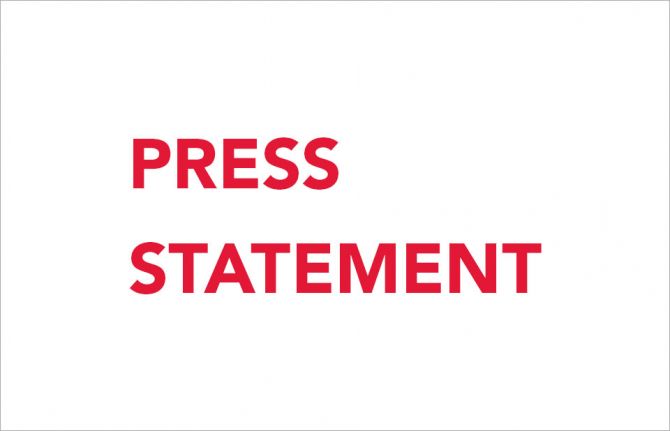
Press Statement
UN80 Secretary-General's report - UNAIDS statement
23 September 2025 23 September 2025Delivering to end AIDS by 2030 and sustain the HIV response beyond—UNAIDS’ transition within the UN80 vision
GENEVA, 19 September 2025—The United Nations Secretary-General has put forward UN reform proposals in his new UN80 progress report, Shifting Paradigms: United to Deliver, which UNAIDS plans to discuss with its board and stakeholders. As underscored by the Secretary-General, it is with member states and governing bodies to determine the way forward on how UN80 reforms are implemented.
UNAIDS has been working within the Secretary-General’s UN80 vision, and consulted with the UN80 team, as it developed transformation plans. UNAIDS has been advancing on its transition path and is proud to help lead the way as the UN system reforms.
A new operating model, and a transition path that consists of two phases, has been developed through a broad and inclusive consultation process, and approved by the UNAIDS Board in June 2025. It was informed by the recommendations of the High-Level Panel on a resilient and fit-for-purpose UNAIDS Joint Programme, which was composed of diverse member states, civil society and other stakeholders. In July 2025, ECOSOC took note of the new operating model and proposed transformation process.
This new operating model aligns with the UN80 vision for a more integrated, coherent, and impactful UN development system. It is a two-phase transformation—one now being implemented, and the second phase starting in 2027 leading to fuller integration in the UN system.
The first phase of transformation includes a 55% reduction in UNAIDS Secretariat staffing (from 661 to 294 staff). UNAIDS’ country presence is being consolidated from 85 to 54 countries, with a lighter footprint in 40 countries. This deployment supports countries where 80% of people living with HIV reside and where 71% of new infections occur. UNAIDS Senior Coordinators are planned to be embedded in 21 UN Resident Coordinator offices (40% of UNAIDS country coverage), and programmatic expertise is being relocated to regional hubs in Nairobi, Johannesburg and Bangkok. UNAIDS’ Geneva presence is being reduced by over 80%.
In the second phase, per the UNAIDS Board’s decision, the Joint Programme will present to its Board a plan for its consideration in June 2027 to further transform, consolidate and integrate with a view to eventually closing down the UNAIDS Secretariat in its current form. This will include greater mergers and consolidations with Cosponsors and transfer of some functions to countries and other entities such as Africa Centres for Disease Control and Prevention (CDC). Based on the Board decisions, the scheduled ECOSOC resolution on the Joint Programme in 2027 will review the UNAIDS mandate.
UNAIDS’ priority is to support inclusive, multisectoral, and sustainable national HIV responses, led by governments and communities, and increasingly funded by domestic resources. AIDS is not over; the global AIDS response has been upended in recent months and much more needs to be done to achieve the SDG target of ending AIDS by 2030.
In 2025 and 2026, in parallel with the implementation of its new operating model, UNAIDS is focused on delivering an ambitious new Global AIDS Strategy 2026-2031 and getting member states’ consensus on 2030 HIV targets through the High-Level Meeting on HIV in June 2026. UNAIDS has a commitment to ensure that new HIV prevention innovations – capable of decisively changing the trajectory of new infections – are made available, and the more than 40 million people living with HIV have continued uninterrupted access to treatment and remain virally suppressed.
UNAIDS
The Joint United Nations Programme on HIV/AIDS (UNAIDS) leads and inspires the world to achieve its shared vision of zero new HIV infections, zero discrimination and zero AIDS-related deaths. UNAIDS unites the efforts of 11 UN organizations—UNHCR, UNICEF, WFP, UNDP, UNFPA, UNODC, UN Women, ILO, UNESCO, WHO and the World Bank—and works closely with global and national partners towards ending the AIDS epidemic by 2030 as part of the Sustainable Development Goals. Learn more at unaids.org and connect with us on Facebook, Twitter, Instagram and YouTube.

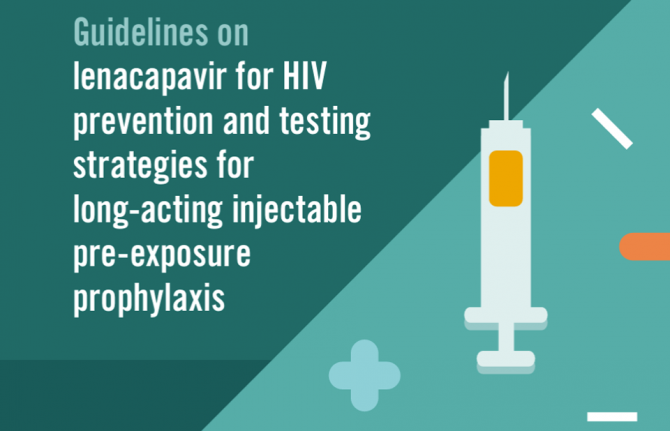
Press Statement
UNAIDS welcomes new WHO guidelines on Lenacapavir
15 July 2025 15 July 2025GENEVA, 15 July 2025–Lenacapavir–a long-acting, six-monthly injectable antiretroviral medicine manufactured by Gilead Sciences–is now recommended by the World Health Organization as an additional HIV prevention choice as part of combination HIV prevention approaches.
Lenacapavir, a new pre-exposure prophylaxis (PrEP) medicine, has the potential to increase the uptake of PrEP and bolster HIV prevention overall as it allows people to choose a method that they prefer. Lenacapvir, administered twice a year, is highly effective at reducing the risk of HIV acquisition.
At a time when funding cuts could lead to an additional 6 million HIV infections and 4 million AIDS-related deaths by 2029, long-acting injectable medicines are a fresh option for all people at risk for HIV--especially those who face higher risk and in locations where the virus is highly prevalent: adolescent women and girls, LGBTQI+ people, sex workers and people who use drugs.
As Gilead has not yet registered Lenacapavir for regulatory approval in all countries, many people, including those facing disproportionate risk for HIV, may have to wait longer than others to access this life-saving tool.
Transparency in production costs and pricing strategies is fundamental to removing some market barriers to universal access to innovative products. UNAIDS remains committed to ensuring full transparency from originator pharmaceutical companies regarding how much health technologies cost to produce and at what level they are priced. Lenacapavir is no exception. Research shows that Lenacapavir can be produced at a thousand times less than its US price. Dozens of developing countries have been excluded from the licenses for generic Lenacapavir and for cabotegravir (another long-acting injectable antiretroviral for HIV manufactured by ViiV Healthcare).
The volume of Lenacapavir must be scaled up – but to do so, we need accessibility and affordable prices. Lenacapvir’s limited availability and unaffordable price not only threatens lives, it also undermines the potential positive impact Lenacapavir could have on the AIDS pandemic. Significant funding cuts to foreign assistance for HIV have plunged the global response into crisis. In addition to viral suppression among people living with HIV, ensuring broad, rapid and affordable dissemination of this new health technology would hasten the decline of new HIV infection rates and would help limit the scope of the pandemic; essential, especially in a moment of constrained resources.
UNAIDS urges Gilead to swiftly register Lenacapavir for regulatory approval in all low- and middle-income countries - starting with those with the highest HIV incidence - and to ensure affordable access for everyone who could benefit, wherever they live. UNAIDS also encourages countries to prioritize prevention options that deliver impact and use simplified and differentiated delivery of prevention services to reach those in need.
There is no more time to waste. Governments, civil society, and the private sector need to take all steps necessary to enable equitable, global access to new health technologies for HIV such as Lenacapavir and Cabotegravir - and UNAIDS is here to support them.
UNAIDS
The Joint United Nations Programme on HIV/AIDS (UNAIDS) leads and inspires the world to achieve its shared vision of zero new HIV infections, zero discrimination and zero AIDS-related deaths. UNAIDS unites the efforts of 11 UN organizations—UNHCR, UNICEF, WFP, UNDP, UNFPA, UNODC, UN Women, ILO, UNESCO, WHO and the World Bank—and works closely with global and national partners towards ending the AIDS epidemic by 2030 as part of the Sustainable Development Goals. Learn more at unaids.org and connect with us on Facebook, Twitter, Instagram and YouTube.
